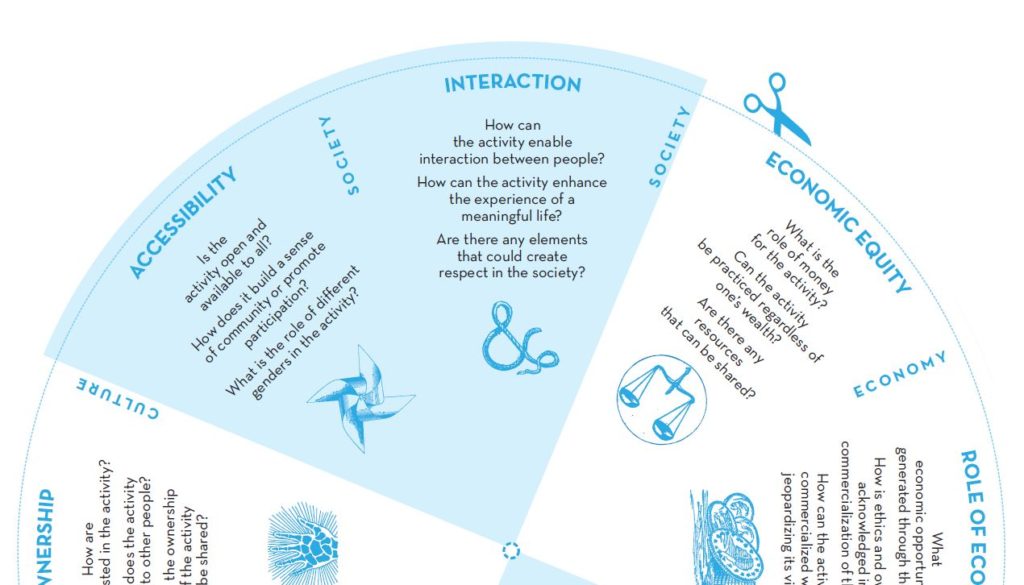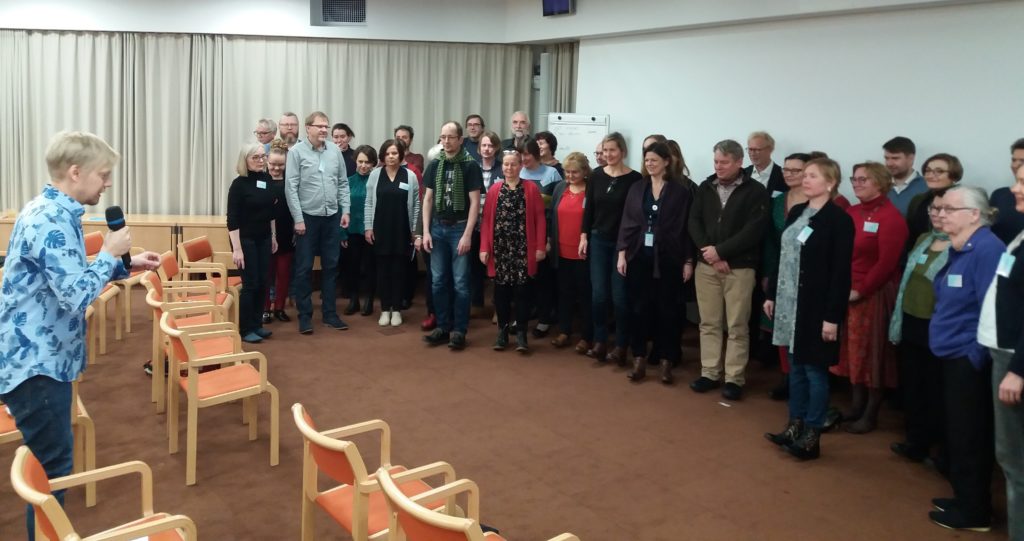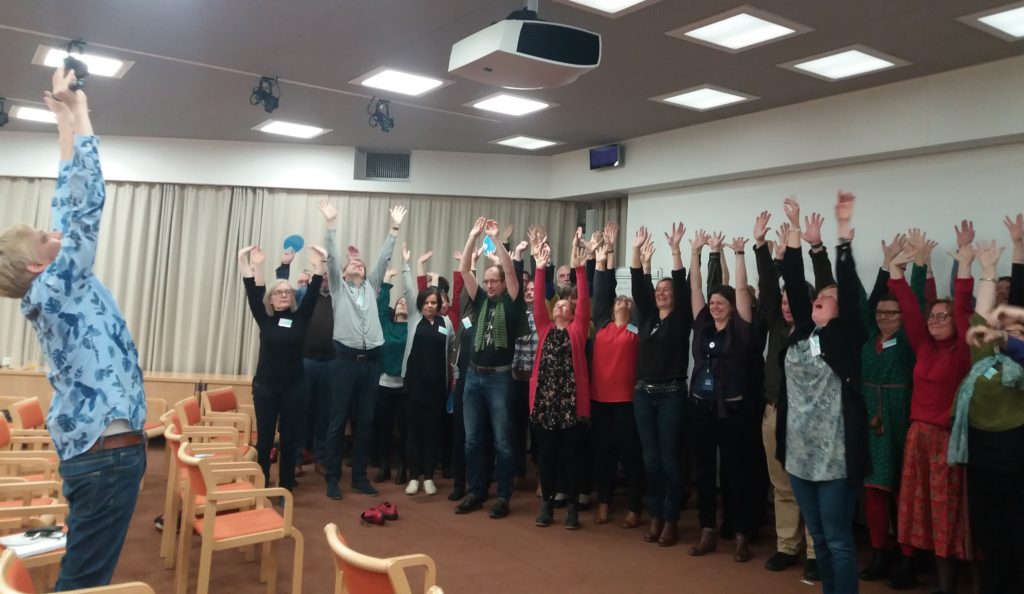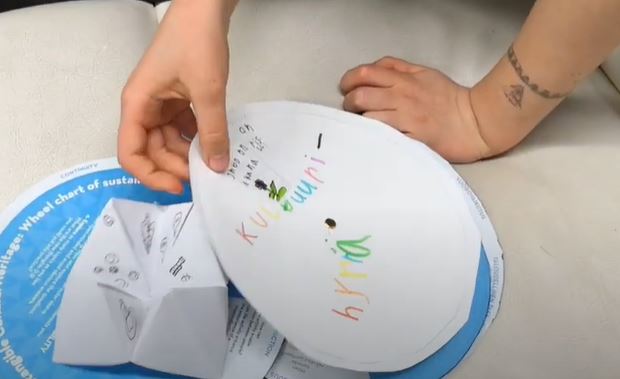Culture creates stability – THE WHEEL CHART OF SUSTAINABILITY – Leena Marsio (June 2020)
A new tool, the Wheel Chart of Sustainability, was developed in Finland to help cultural organisations analyse and develop their own activities in accordance with the principles of sustainable development. This Wheel Chart divides the four different dimensions of sustainable development (ecological, economic, social and cultural) into eight different subject areas with three questions each. The Wheel Chart is a tool for dialogue and development. You can download and print it for free from the web in several different languages.

What does sustainable development mean in practice in cultural organisations, museums and various heritagecommunities? What does it actually mean, aside from rhetorical statements in strategies, and what is it about, aside from waste management? How can we concretely make the world a better place through our actions?
These questions were in our minds when we started to design the Wheel Chart of Sustainable Development in Finland, with the goal to create a concrete tool for starting discussions and developing activities in both large and smaller communities. The Wheel Chart team was constituted of experts from various organisations: Finnish Heritage Agency, Arts Promotion Centre Finland, Futures Research Centre / University of Turku, The Association for Cultural Heritage Education, and the Finnish Folk Music Institute and Humap. Our starting point was intangible cultural heritage, but we soon discovered that the tool had numerous additional applications.
It was important to us to address all four dimensions of sustainable development: ecological, economic, social and cultural. These pillars have been divided into eight subject areas, which have three questions each. For example, the tool helps you consider the nature and impact of specific activities and think about what concrete actions could be developed based on the insights gained through the discussions.

Antti Huntus and workshop participants, World Saving Clinic (photo by Leena Marsio)
We were able to test the Wheel Chart early on, during its development stages in autumn 2019, at the World Saving Clinic, which gathered together about fifty professionals from various countries of living cultural heritage, such as musicians, storytellers, fishermen, artisans as well as museum professionals and researchers. During the workshops, we were able to see how the Wheel Chart can be used for many applications, allowing organisations ranging from nature associations to handcrafting clubs and museums find new perspectives for their work.

Antti Huntus and participants of the workshop at the World Saving Clinic (photo by Leena Marsio)
“People need good questions through which they can apply the principles of sustainable development in practice. A good question activates our desire to develop and, at its best, it can transform into an idea that drives the operations,” says senior advisor Leena Marsio from the Finnish Heritage Agency.
Now, the Wheel Chart has spread around the world. It has been distributed to the leaders of European museums at NEMO’s annual conference in Estonia 2019, to representatives of more than 120 countries and dozens of NGOs at UNESCO’s Committee meeting of intangible cultural heritage in Colombia 2019. New translations are created all the time. Additionally, new versions have started to appear, such as the children’s own Wheel Chart. The Wheel Chart is covered by the creative commons 4.0 licence and is therefore available for anyone to use and be inspired by.

Wheel Chart of Sustainability-version for children (still from the YouTube video by Finnish Local Heritage Federation)
The recipe is simple: go to the website, print out your own version, set up a workshop (live or online) and start a conversation. You can also come up with your own questions. Discussion is the key, and open and critical inspection of one’s own actions from all perspectives of sustainability is central, whether it’s about developing your work, hobbies or the operations of your organisation.
We hope to see this tool used all over the world!
The Wheel Chart of Sustainability has been developed as a part of a project ‘Northern Dimension Partnership on Culture: Creating new practises of sustainability – Cross-sectorial creativity in the era of climate change’: This project is a creative answer to supporting sustainable development through the means of art and culture.
Download the Wheel Chart here: https://www.aineetonkulttuuriperinto.fi/en/julkaisut/wheelchart
Leena Marsio is a senior advisor at the Finnish Heritage Agency, and Antti Huntus is a senior advisor at the Arts Promotion Centre Finland
@museovirasto @taiketweet @LeenaMarsio @AnttiHuntus
https://www.facebook.com/elavaperinto/https://www.facebook.com/Museovirasto/
https://www.facebook.com/Taike.fi/